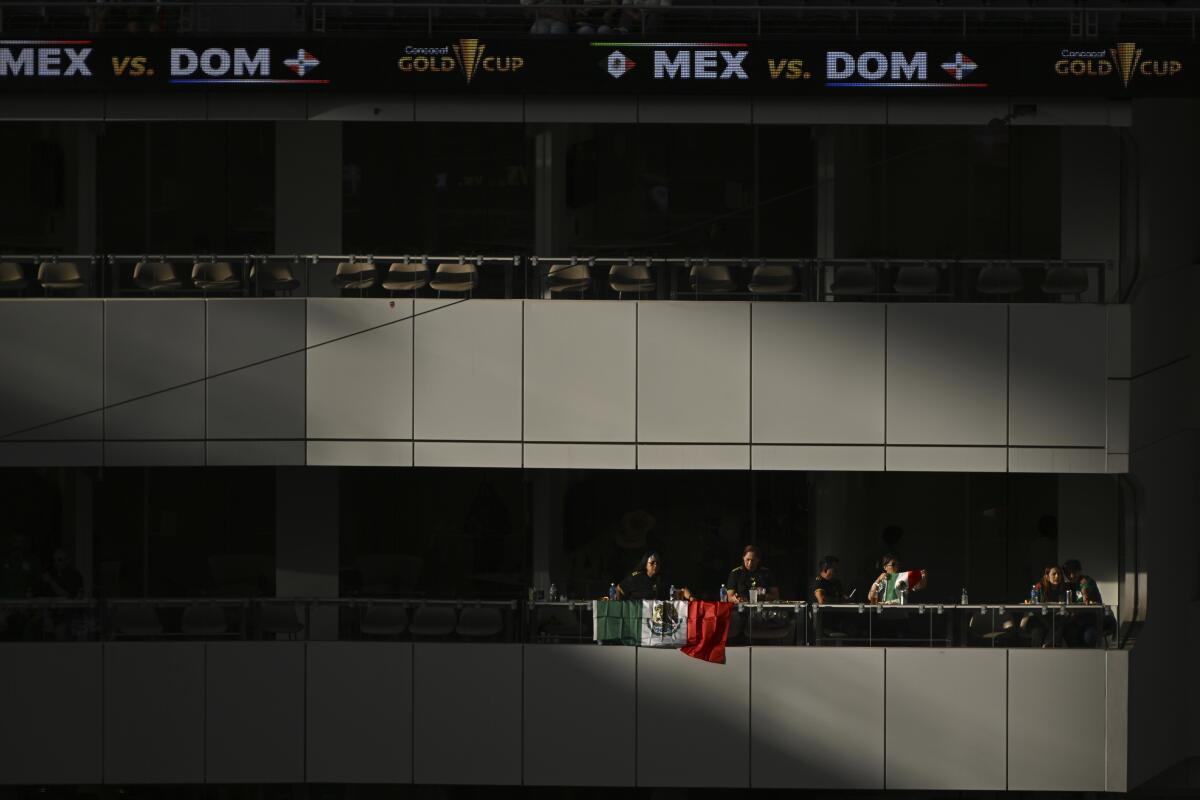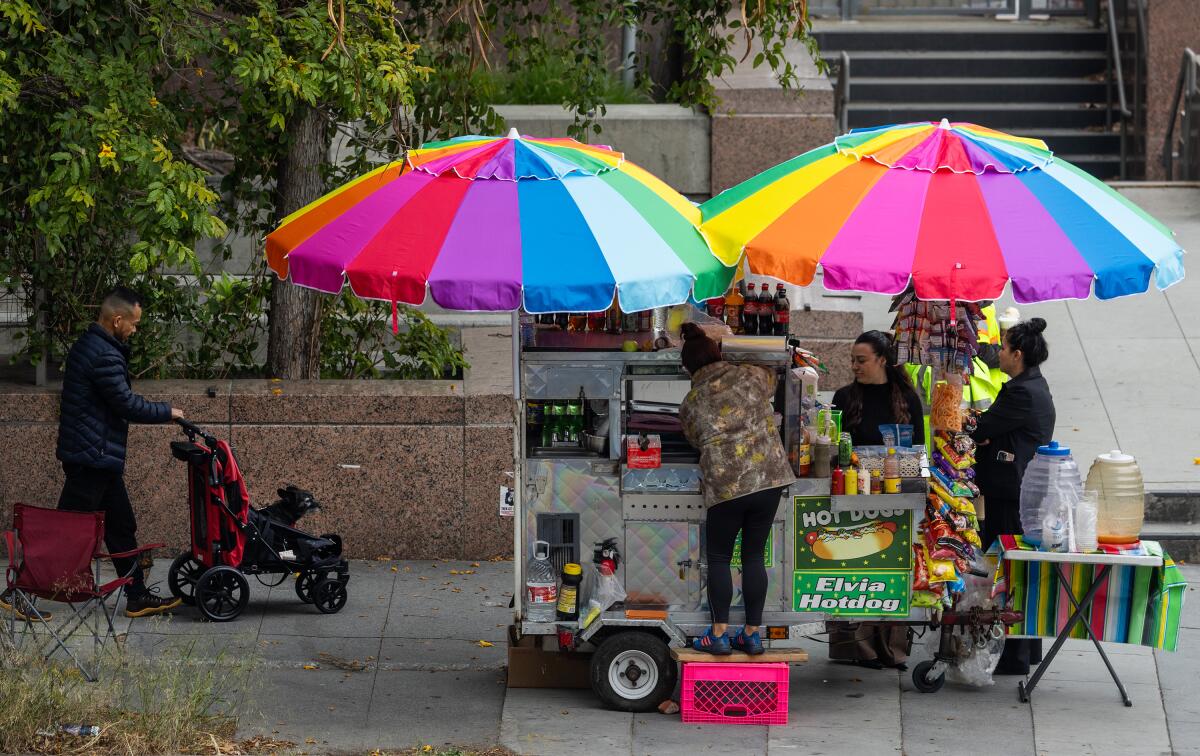Immigration attacks continue, adding more anxiety

Immigration raids continued to cause anxiety and anger throughout California’s weekends.
Witnesses said armed, masked U.S. immigration and customs law enforcement officers performed a raid at a Santa Fe Hot Springs conference hours before a concert began.
According to witness Howie Rezendez, agents arrived at the Santa Fe Springs swap meeting, where he photographed the armed personnel, Howie Rezendez jumped out of the vehicle and entered the field.
-
Shared by
“There are about 50 to 80 agents,” Rezendez said. “They have more than 30 vehicles and vans with agents, and three helicopters.” ”
A concert featuring musical performances such as the concerts of Los Cadetes de Linares, Los Dinamicos del Norte and La Nueva Rebelión were originally scheduled to begin at 5:30 pm, but online videos of witnesses showed that the venue was almost vacant compared to the large crowds, which was attractive compared to the masses.
Rezendez said Omar Benjamin Zaldivar, who left around 4:30 p.m., also recorded the agent, who said Ice took over “a group of people.”
“If you look at Hispanics in any way, they take you away,” Zardival said.
The number of people swept from the raid remains unclear.
Shortly after the raid, the swap meeting with officials postponed the concert.
“We will provide details later,” the Instagram post said.
Exchange meeting officials did not immediately respond to requests for comment.
The 17-acre outdoor hub was first opened in 1965. Santa Suprils swap is famous for its hot spots in Música Mexicana, and an outdoor concert is held every weekend. Other popular Latino swaps also appear to be vacant in Los Angeles during the ongoing ice raid.
The Whittier exchange meeting, which was closed last week, was preparing for a possible raid.
Whittier Police Department did not immediately respond to a request for comment.
Tensions were also felt during a big football match at Sofi Stadium on Saturday night.
Waving the Mexican flag and criticizing President Trump’s signs, about 300 people played the group stage at the 2025 CONCACAF Gold Cup in Inglewood on Saturday afternoon.

Protesters marched in Inglewood on Saturday with Intuit Dome in the background.
(Luke Johnson/Los Angeles Times)
Esmeralda Sanchez, who does not compete, said she came to the rally to support family and friends who are illegally in the country.
“We are the impossible voices of our parents and older generations,” Sanchez said in the horns and cheers.
The parking lot outside the stadium feels relatively soft, with some fans making Carne Asada on portable grills while others waving Mexican flags.
Emilio Estrada and Ashley Ruiz from Bakersfield
“My mom kept calling me when we drove down,” Estrada said.
Jesse Murillo of Orange County said participating in the game to support the Mexican national team felt like a clear sign of protests against the federal government.
“We are not afraid to come here to show our colors,” he said. “Anyway, our people always find a way to be here.”

Fans arrive inside the Sofi Stadium before the CONCACAF Gold Cup group stage between Mexico and the Dominican Republic.
(Wally Skalij/AP)
His friend Richard Barrera said many people were scared because so much information and misinformation surrounds social media.
“It seems unfair to have so many people living in fear because you see a lot of things online and then it turns out that ice doesn’t exist,” Barrera said.
Inglewood native Jorge Gomez said across the street from the stadium that he was nervous about participating in any protests due to immigration raids carried out in Southern California.
“I’ve been trying to stay more alert and be more careful,” he said. “I shouldn’t be here, but I’m – because deep down I’m constantly telling me it’s wrong and I need to stand up.”
Fruteros Other street vendors emptied the streets of Los Angeles amid widespread immigration sweep, fearing they were arrested and deported.
But Koreatown-based nonprofit recently launched a fundraising campaign to offset lost wages, donate to pay rent, utilities and other essentials, and allow suppliers to stay at home.
“Even if it’s so dangerous for their safety right now, their reason is that the rent is high and they have bills,” said Andreina Kniss, organizer and long-time volunteer at Ktown.
“We got together and we said, ‘Every day we can get them out of the streets is their safer day.’”
Ktown everyone purchases donations through Venmo, and the account information is posted to Instagram, which is then carefully distributed to dozens of street vendors to cover 30-day rent and bills. According to Kniss, they raised more than $50,000 last week.
Since its inception in 2018, everyone in Ktown has focused most of its efforts on advocating Koreatown’s unpopular population and distribution resources such as water, blankets, laundry and prepared food. In feeding this crowd, Ktown members have established connections with street vendors in the community.

Many street food vendors are often a common sight in Southern California, fearing they are caught by immigration agents and staying at home.
(Myung J. Chun/Los Angeles Times)
During difficult times for economic sellers, such as emergencies such as rainy season or January fires, nonprofits have launched a “Supplier Buyout” program to help sustain them. “Buyout” foods such as tortillas and tortillas were donated from suppliers, and Ktown was then provided to all volunteers to distribute them to those in need. Now, nonprofits are approaching vendors with Koreatown and asking, “What do you need to get you off the streets?”
Many suppliers are simply paid without providing food. “We are street vendors,” a donation recipient told Ktown everyone, keeping their name to remain anonymous.
“We are afraid to get out and all we want is to work for our family.”
“Many of them currently have no financial support,” Nice said. “It’s really disgusting to have to choose,” [between] Pay the bill or be kidnapped. ”
For Kniss, the reason is personal. She grew up in a family of immigrant and peasant men on the Central Coast and became a U.S. citizen five years ago.
“It was one of those families who lived in fear and seeing the way our street vendors live in horror was really touching me,” she said.
The nonprofit plans to raise funds for a “buyout of suppliers” until ICE leaves Los Angeles or until the money runs out, and often find new street vendors to support through its network.
The program’s coverage has been expanded outside Koreatown, help Frutero Hot dog sellers in Echo Park, downtown Los Angeles And then. Nice said the community’s response was overwhelming.
She hopes other co-aid groups will “replicate” the method.
Another anonymous vendor wrote to everyone.
“But now this government [has] The same fear surfaced and horrified the most authentic, kindest and hardworking immigrants I’ve known in my life. ”



